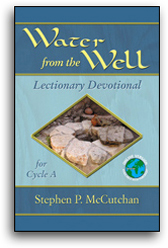Proper 10 / Pentecost 8 / OT 15
Devotional
Water From the Well
Lectionary Devotional For Cycle A
Object:
Isaac loved Esau, because he was fond of his game; but Rebekah loved Jacob.
-- Genesis 25:28
Rebekah had gone directly to God concerning the struggle that was taking place in her womb, and she was told of the twins that would be born to her. If Rebekah serves as the mother of our faith, then the twins reflect the dual emphasis that struggles within our faith. Esau is the action-oriented, physical one. He is the man of the world that focuses on what can be done. Jacob is the mind-oriented thinker. He is the person of reflection who plans ahead. In a way, this could be seen as the prefiguring of the later Mary and Martha story (Luke 10:38-42). Within the community of faith, there are the action-oriented members who are always asking, "What are we going to do?"
There is also an element that is more focused on reflection. For them, the path of faith centers on the mind. Each element needs the other to guard against their own inherent dangers. The action-oriented are tempted to believe that what is done in the moment is what is important. Their whole energy is focused on the project. They are always in danger of selling their soul for a mess of pottage. Those who focus on the mind are tempted to use their minds to manipulate the other and become lost in their schemes. A person who only reflects on faith can easily become lost in thought, and there is no fruit from their faith that others can feed upon. Faith without deeds is dead according to James. But action without reflection can become superficial. When the twins continued to struggle against each other, as they have a tendency to do within the church, they were failing to realize how much they needed each other. We are saved by faith, but faith without deeds is dead. Neither can despise their birthright nor neglect the gifts of the other.
-- Genesis 25:28
Rebekah had gone directly to God concerning the struggle that was taking place in her womb, and she was told of the twins that would be born to her. If Rebekah serves as the mother of our faith, then the twins reflect the dual emphasis that struggles within our faith. Esau is the action-oriented, physical one. He is the man of the world that focuses on what can be done. Jacob is the mind-oriented thinker. He is the person of reflection who plans ahead. In a way, this could be seen as the prefiguring of the later Mary and Martha story (Luke 10:38-42). Within the community of faith, there are the action-oriented members who are always asking, "What are we going to do?"
There is also an element that is more focused on reflection. For them, the path of faith centers on the mind. Each element needs the other to guard against their own inherent dangers. The action-oriented are tempted to believe that what is done in the moment is what is important. Their whole energy is focused on the project. They are always in danger of selling their soul for a mess of pottage. Those who focus on the mind are tempted to use their minds to manipulate the other and become lost in their schemes. A person who only reflects on faith can easily become lost in thought, and there is no fruit from their faith that others can feed upon. Faith without deeds is dead according to James. But action without reflection can become superficial. When the twins continued to struggle against each other, as they have a tendency to do within the church, they were failing to realize how much they needed each other. We are saved by faith, but faith without deeds is dead. Neither can despise their birthright nor neglect the gifts of the other.


